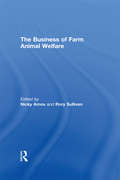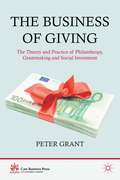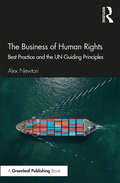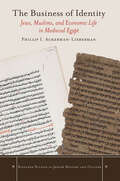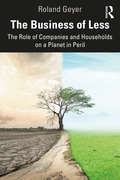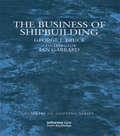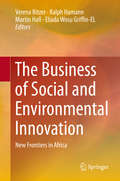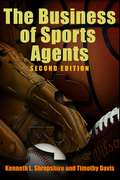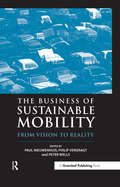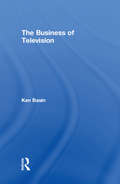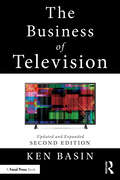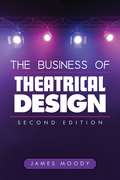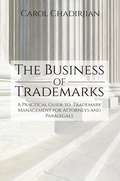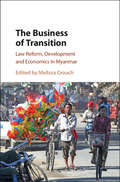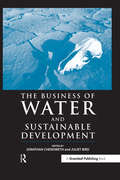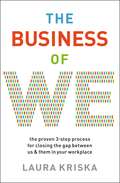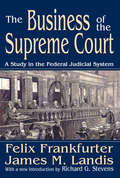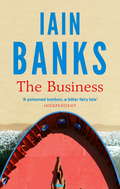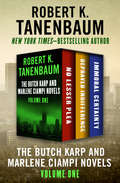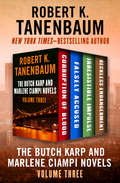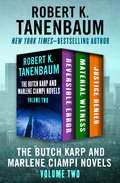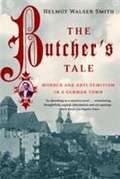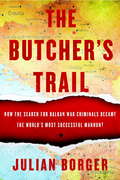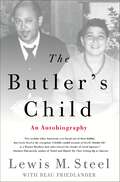- Table View
- List View
The Business of Farm Animal Welfare (The Responsible Investment Series)
by Nicky Amos Rory SullivanGlobally, nearly 70 billion animals are farmed annually for meat, milk and eggs. Two-thirds of these are farmed intensively. The views held by food companies on animal stewardship, and the management practices and processes that they adopt are, therefore, of critical importance in determining the welfare of these animals. Yet, despite the scale of the food industry’s impact, farm animal welfare remains a relatively immature management issue. There is a lack of consensus around the specific responsibilities companies have for farm animal welfare, and around how companies should treat the animals in their or in their suppliers’ care. This book, The Business of Farm Animal Welfare, provides an extensive, authoritative analysis of current corporate practice on farm animal welfare. It critically reviews and assesses the ethical and business case for action. Through a series of practitioner case-studies, it describes how companies have addressed farm animal welfare in their operations and supply chains. It analyses the key barriers to companies adopting higher standards of farm animal welfare, and offers a series of practical recommendations to companies, consumers and policy makers on the role that they might play in raising farm animal welfare standards across the food industry. As the first comprehensive account of business and farm animal welfare, this book is an essential resource for researchers, practitioners and general readers looking to understand and influence corporate practice on farm animal welfare.
The Business of Giving
by Peter GrantThe Business of Giving reviews current thinking and surveys the key techniques any philanthropist or grantmaker should adopt. It also outlines a generic social investment process that can be utilized for all philanthropic or grantmaking programmes. Essential reading for all engaged in or with an interest in philanthropy or civil society in general.
The Business of Human Rights: Best Practice and the UN Guiding Principles
by Alex NewtonThe spotlight of global scrutiny has shone particularly brightly on corporations’ adverse impacts on human rights in recent years. Corporations make up more than two-thirds of the world’s top economies today, and so rightly they are being called to account for their impacts on society and the communities in which they operate. The Business of Human Rights demystifies the relevance of human rights for business, explaining how the corporate responsibility to respect human rights under the UN Guiding Principles can be implemented in practice. It provides a straightforward, practical guide that can be easily read and interpreted by managers to help businesses navigate this complex area of legislation and "soft" law to fulfil their responsibilities. It explains the potential legal, financial and reputational implications for corporations and the steps they need to take to address them. The book tracks some of the major global developments in business and human rights, including the emergence of foreign, transnational, and international law and the proliferation of multi-stakeholder initiatives on business and human rights. Case studies from a range of sectors and industries – such as extractives, apparel, fast-moving consumer goods, electronics, and banking and finance – illustrate the enormous risks and opportunities human rights pose for business in practice. The Business of Human Rights will equip corporate executives, sustainability practitioners, academics, students, and anyone interested in business’s impacts on society with the essential information and tools they need to quickly come up to speed with the rapidly evolving area of business and human rights.
The Business of Identity: Jews, Muslims, and Economic Life in Medieval Egypt
by Phillip I. Ackerman-LiebermanThe Cairo Geniza is the largest and richest store of documentary evidence for the medieval Islamic world. This book seeks to revolutionize the way scholars use that treasure trove. Phillip I. Ackerman-Lieberman draws on legal documents from the Geniza to reconceive of life in the medieval Islamic marketplace. In place of the shared practices broadly understood by scholars to have transcended confessional boundaries, he reveals how Jewish merchants in Egypt employed distinctive trading practices. Highly influenced by Jewish law, these commercial practices served to manifest their Jewish identity in the medieval Islamic context. In light of this distinctiveness, Ackerman-Lieberman proposes an alternative model for using the Geniza documents as a tool for understanding daily life in the medieval Islamic world as a whole.
The Business of Less: The Role of Companies and Households on a Planet in Peril
by Roland GeyerThe Business of Less rewrites the book on business and the environment. For the last thirty years, corporate sustainability was synonymous with the pursuit of ‘eco-efficiency’ and ‘win-win’ opportunities. The notion of ‘eco-efficiency’ gives us the illusion that we can achieve environmental sustainability without having to question the pursuit of never-ending economic growth. The ‘win-win’ paradigm is meant to assure us that companies can be protectors of the environment whilst also being profit maximizers. It is abundantly clear that the state of the natural environment has further degraded instead of improved. This book introduces a new paradigm designed to finally reconcile business and the environment. It is called ‘net green’, which means that in these times of ecological overshoot businesses need to reduce total environmental impact and not just improve the eco-efficiency of their products. The book also introduces and explains the four pollution prevention principles ‘again’, ‘different’, ‘less’, and ‘labor, not materials’. Together, ‘net green’ and the four pollution prevention principles provide a road map, for businesses and for every household, to a world in which human prosperity and a healthy environment are no longer at odds. The Business of Less is full of anecdotes and examples. This brings its material to life and makes the book not only very accessible, but also hugely applicable for everyone who is worried about the fate of our planet and is looking for answers.
The Business of Shipbuilding
by George Bruce Ian GarrardThe Business of Shipbuilding thoroughly analyses vessel construction, from material receipt and preparation, to final outfitting. It explains the central role of computer technology in the design process, the growing importance of supply chain management for materials and services and the use of subcontractors. Methods of measuring progress, productivity, performance and the need for enforcing standards during construction are also discussed. Through the use of practical examples, The Business of Shipbuilding explains the structure of shipbuilding in Japan, Korea, the European Union, China, Eastern Europe and the Americas and places this in the context of the economic and political climate of each region. Written in a clear and concise style and illustrated throughout with diagrams, charts and plans, The Business of Shipbuilding will be an invaluable reference tool both for experienced shipbuilders and for shipowners, managers, operators, brokers, insurers, lawyers, universities, surveyors and equipment suppliers.
The Business of Social and Environmental Innovation
by Martin Hall Verena Bitzer Ralph Hamann Eliada Wosu Griffin-ELIn the face of limited progress toward meeting Millennium Development Goals or addressing climate change and resource degradation, increasing attention turns to harnessing the entrepreneurial, innovative, managerial and financial capacities of business for improved social and environmental outcomes. A more proactive role for business in sustainable development is especially pertinent in sub-Saharan Africa, which has been plagued by conflict and poverty but shows signs of a brighter future as the world's second-fastest-growing region. The book considers how the socio-economic context influences the objectives of social innovation and even our definition of what we mean by social innovation. Secondly, the book aims to show how social innovation initiatives emerge and fare in context of the limited ability of many African countries to provide public goods and services.
The Business of Sports Agents
by Kenneth L. Shropshire Timothy DavisThe legendary Charles C. "Cash and Carry" Pyle, considered by most to be the first sports agent, negotiated a $3,000-per-game contract for Red Grange to play professional football for the Chicago Bears in 1933. Today, salaries in the tens of millions of dollars are commonplace, and instead of theatrical promoters and impresarios, professionally trained businessmen and lawyers dominate the business. But whereas rules and penalties govern the playing field, there are far fewer restrictions on agents. Incidents of agents' manipulating athletes, ranging from investment scams to outright theft of a player's money, are far too frequent, and there is growing consensus for reformIn The Business of Sports Agents, Kenneth L. Shropshire and Timothy Davis, experts in the fields of sports business and law, examine the history of the sports agent business and the rules and laws developed to regulate the profession. They also consider recommendations for reform, including uniform laws that would apply to all agents, redefining amateurism in college sports, and stiffening requirements for licensing agents. This revised and expanded second edition brings the volume up-to-date on recent changes in the industry, including:- the closing of one of the largest agencies- high-profile personnel moves- passage of the federal Sports Agent Responsibility and Trust Act- the National Football League's aggressive and high-profile efforts to regulate agents
The Business of Sustainable Mobility: From Vision to Reality
by Peter Wells Paul Nieuwenhuis Philip VergragtIn many parts of the world, there is a crisis of mobility. The choices we have made over the past 200 years on modes and technologies of transport have brought us unprecedented global interaction and in many respects increased personal freedom. However, all this mobility has come at a cost to society, to the economy and to the environment. Mobility is in crisis, but few seem aware of the full extent of it. Though most people will be aware of congestion, accidents (although this aspect is often overlooked), parking restrictions or fuel prices, few will have considered the effects of the dramatic increase in mobility expected in China, India and elsewhere. Nor do many people in their daily lives consider the impact of climate change on our environment and the contribution our cars make to it. It is often thought that technology alone can solve this problem. For some observers, salvation could be achieved by means of hydrogen fuel cells, by hybrid cars, or by increased fuel efficiency, or even by telematics to reduce congestion. This book shows that "technology" may well not be enough in itself and that for a genuinely sustainable transport future far more radical change – affecting many aspects of society – is needed. It is likely, for example, that new business models are needed, as well as users and consumers adopting new forms of behaviour. Disruptive technological innovation may well contribute, but needs to be induced by a combination of market forces and government regulation.Many studies touch on transport and mobility issues and more mainstream books aimed at challenging the dominance of automobility are common, yet works dealing with the longer-term strategic, theoretical and broader conceptual issues needed to inform the move towards more sustainable transport are rare. Yet policy-makers, practitioners, as well as many sections of academia, acknowledge a need for guidance on new thinking on sustainable mobility. This book brings together a range of views representing both leading-edge thinking and best practice in the mobility sector. The individual expert contributions form the basis for framing a broader vision of future mobility and proposed transition trajectories towards that future.Much of the effort reflected in the chapters in this book is concerned with going beyond the "technofix" of new cars, to confront the more difficult challenges of institutional, cultural and social change within and beyond the industry that have to be resolved in the transition towards sustainability. It therefore seeks to break through the conventional boundary between engineering and the social sciences, and the contributors come from both sides of this traditional but unnecessary divide, combining economists, engineers, geographers, designers and others.The work is based on the sustainable mobility stream in the 2003 International Greening of Industry Network conference in San Francisco. This event brought together experts from industry and government, and the book combines some of the papers presented there, developed and updated into full chapters, with a number of additional chapters to capture some of the themes that emerged from the conference.The central problem addressed in this book is the private car: how to power it, how to build it and how to deliver it to customers in a more sustainable future. It starts with ideas of radical innovation in the propulsion system of the car, notably the hydrogen fuel cell. In one section, the book examines business models that could be used to deliver automobility in a more sustainable manner. This section looks at how the car is made and used, and looks beyond it by examining how we could change those aspects in our quest for sustainable mobility. The book then considers a number of recently introduced vehicles and alternative vehicle concepts within the context of a dominant existing paradigm. These vary from a minimalist single-seat commuter to a powertrain exchange concept that could breathe new life into the electric vehicle. A number of chapters then report on current practice
The Business of Television
by Ken BasinIn this book, esteemed television executive and Harvard lecturer Ken Basin offers a comprehensive overview of the business, financial, and legal structure of the U.S. television industry, as well as its dealmaking norms. Written for working or aspiring creative professionals who want to better understand the entertainment industry — as well as for executives, agents, managers, and lawyers looking for a reference guide — The Business of Television presents a readable, in-depth introduction to rights and talent negotiations, intellectual property, backend deals, licensing, streaming platforms, international production, and much more. The book also includes breakdowns after each chapter summarizing deal points and points of negotiation, a glossary, a list of referenced cases, and a wealth of real-world examples to help readers put the material into context.
The Business of Television: Updated and Expanded Second Edition
by Ken BasinIn this expanded and updated second edition, esteemed television executive and Harvard lecturer Ken Basin offers a comprehensive and readable overview of the business, financial, and legal structure of the U.S. television industry, as well as its deal-making norms.The Business of Television explores the basic structure and recent history of the television and streaming business, rights and talent negotiations, intellectual property, backend deals, licensing, international production, and much more. This expanded and updated second edition also features an in-depth exploration of the evolution of the streaming business, offers valuable new insights about negotiation, reflects the historic impacts of the 2020 Covid-19 pandemic and 2023 WGA and SAG-AFTRA strikes, addresses the intersection of artificial intelligence technology and intellectual property law, and provides a greater breadth and depth of technical material about a wide variety of common television deals. The book also includes breakdowns after each chapter summarizing major deal terms and points of negotiation, a significantly expanded glossary, an extensive list of referenced articles and cases, and a wealth of real-world examples to help readers put the material into context.Written for a diverse audience of working or aspiring creative professionals, executives, agents, managers, lawyers, and students, The Business of Television is the definitive reference guide for the ever-changing television industry.
The Business of Theatrical Design, Second Edition
by James MoodyWritten by a leading design consultant and carefully updated with the latest information on the industry, this is the essential guide to earning a living, marketing skills, furthering a design career, and operating a business. With more than thirty years of backstage and behind-the-scenes experience in theater, film, television, concerts, and special events, James Moody shares his success secrets for the benefit of design students and working designers. Topics include: Finding and landing dream assignmentsNegotiating feesSetting up ideal working spacesBuilding the perfect staffOvercoming fears of accounting and record-keepingChoosing the right insuranceJoining the right unions and professional organizationsAnd more In addition to revealing how to get the great design jobs in traditional entertainment venues, the author shows designers how to think outside the box and seize creative, lucrative opportunities—such as those in theme parks, in concert halls, and with architectural firms. Providing the keys for passionate, talented designers to become successful businesspeople, The Business of Theatrical Design is a must-read for novices and established professionals alike.
The Business of Trademarks: A Practical Guide to Trademark Management for Attorneys and Paralegals
by Carol ChadirjianWe come in contact with many trademarks each day on television, retail stores, Internet. The Business of Trademarks explains why trademarks are so important to businesses and how they identify the manufacturer and guarantee consistent quality to achieve brand loyalty. The Business of Trademarks is intended as a practical guide for those new to trademarks, including attorneys, paralegals and law students requiring a concise, comprehensive book on trademark prosecution to gain the skills and knowledge necessary to perform day-to-day trademark work diligently, confidently and with efficiency. Specific topics covered are:°* Trademark searching for clearance°* Forms to be filed with the Patent and Trademark Office°* Famous trademarks and trade dress°* Responding to office actions°* Methods of enforcing trademarks°* Trademarks in commercial transactions°°The Business of Trademarks is unique from other publications because it explains trademark management from a hands-on approach, including administrative duties which few attorneys handle themselves.
The Business of Transition: Law Reform, Development and Economics in Myanmar
by Melissa CrouchThis interdisciplinary volume offers a timely reflection on law, development and economics through empirical and comparative perspectives on contemporary Myanmar. The book explores the business that takes place in times of major political change through law and development initiatives and foreign investment. The expert contributors to this volume identify the ways in which law reform creates new markets, embodies hopes of social transformation and is animated by economic gain. This book is an invitation to think carefully and critically about the intersection between law, development and economics in times of political transition. The chapters speak to a range of common issues - land rights, access to finance, economic development, the role of law including its potential and its limits, and the intersection between local actors, globalised ideas and the international community. This interdisciplinary book is for students, scholars and practitioners of law and development, Asian studies, political science and international relations.
The Business of Water and Sustainable Development: A Special Themed Issue Of Greener Management International (issue 42)
by Jonathan Chenoweth Juliet BirdA renewed commitment to improved provision of water and sanitation emerged in the 2002 Johannesburg Declaration on Sustainable Development. Although many of the statements in the Declaration were vaguely worded, making it hard to measure progress or success, the Plan of Implementation of the Summit, agreed by the delegates to the conference, clearly stated that: "we agree to halve, by the year 2015, the proportion of people who are unable to reach or to afford safe drinking water and the proportion of people who do not have access to basic sanitation". Given the United Nations' predicted growth in global population from 6.1 billion in 2000 to 7.2 billion by 2015, this commitment will pose formidable challenges. To meet it, by the end of just a decade and half, approximately 6.6 billion people will need to have access to safe drinking water supplies. This is more than the current population of the world, and involves not only maintaining existing levels of supply but also providing new or upgraded services to 1.7 billion people. The challenge for sanitation is equally daunting: 5.8 billion people will need to be serviced, including new access provision for 2.1 billion. Even if these ambitious targets are met, representing a major achievement for the global community, there will still be approximately 650 million people in the world without access to safe drinking water and 1.4 billion without sanitation. What is clear is the magnitude of the problem facing the international community in terms of water supply and sanitation. Continuation of the status quo and the type of progress made during the 1990s will not permit the Johannesburg targets to be met. Instead it will be necessary to promote a combination of many different, new and innovative approaches, each of which will contribute towards the overall targets. These approaches must include technological advances that identify new sources and improve the quality of those already in use; managerial techniques that increase the efficiency and effectiveness of service delivery at both micro and macro scale; and fiscal approaches that tap into additional financial resources to make improvements affordable. In the past each of these aspects was seen as primarily the responsibility of government, which supported research into technology, managed supply and disposal systems and provided the funds to pay for them. This view has changed – beginning in the 1980s and increasing in the 1990s with growing moves towards privatisation of many aspects of the water sector. Underpinning this has been a shift away from seeing water as a public good that is essential for life, with subsidised supply provided as part of an overall welfare system, to a more market-oriented approach where the state, although still responsible for maintaining universal access to water services, uses market forces to meet this aim. The Business of Water and Sustainable Development aims to illustrate the range of approaches that will be necessary if the percentage of the global population having access to adequate and safe water and sanitation is to be increased in line with the brave assertions from Johannesburg World Summit on Sustainable Development. Some of approaches will be large-scale "Western-style" improvements involving the creation of new business models, their effectiveness assessed by traditional approaches of fiscal and social analysis. Such schemes may be instigated and partly funded by governments, but are increasingly turning to the private sector for money and expertise. In contrast, many smaller communities would be better served by following another path to improved water supply and sanitation. Because of their size, location or traditions they may achieve better results through the adoption of local small-scale solutions. Non-governmental organisations have been very active in this area, but to extend their operations many are seeking to adopt a more business-like model. All water supply and waste disposal agencies, large or small, need to support and encourage continued rese
The Business of We: The Proven Three-Step Process for Closing the Gap Between Us and Them in Your Workplace
by Laura KriskaDiverse teams add tremendous value to any organization… if they work as a cohesive unit. Empower your leaders to bring together teams made up of members from different cultures, age groups, and socio-economic backgrounds.In today&’s workplace, cross-cultural collaboration is essential to the survival of any business. Unfortunately, bringing together people from a variety of backgrounds can lead to &“us vs. them" misunderstandings and clashes that work against the goals of the company. Too often, well-intentioned consultants and HR representatives attempt to solve these problems with a band-aid approach to situations that warrant comprehensive solutions. Diversity in virtually every U.S. organization has increased over the past twenty years, yet the closest we have come to a workplace best practices guide is online diversity training courses or methods of coaching &“problem&” executives to be more sensitive. Neither of these avenues leads to meaningful change. Kriska teaches leaders in any organization how to prevent &“us vs. them" culture clashes by promoting inclusion in their organization to increase employee retention and productivity and to prevent misunderstandings that lead to lost time and increased legal risk.
The Business of the Supreme Court: A Study in the Federal Judicial System
by James M. LandisAs Felix Frankfurter and James Landis write in their preface to The Business of the Supreme Court, "To an extraordinary degree legal thinking dominates the United States. Every act of government, every law passed by Congress, every treaty ratified by the Senate, every executive order issued by the President is tested by legal considerations and may be subjected to the hazards of litigation. Other Nations, too, have a written Constitution. But no other country in the world leaves to the judiciary the powers which it exercises over us." This classic volume, first published in 1928, originated in a series of articles written by Frankfurter, then a professor of law at Harvard University, and his student, Landis, for the Harvard Law Review. These articles chronicled and analyzed the many judiciary acts that were passed between 1789 and 1925, and illuminated the intimate connection between form and substance in the life of American law. For instance: When a community first decided to enact zoning laws--the Supreme Court had to approve. When the United States made a treaty with Germany following World War I--the Supreme Court had to define the limits and meaning of the treaty.Newly reissued with an introduction by constitutional expert Richard G. Stevens, The Business of the Supreme Court is still as fresh and relevant today as it was when first published. It is a work that will aid the student of the law to both love the law and remain true to its purposes.
The Business: A Novel
by Iain BanksKate Telman is a senior executive officer in The Business, a powerful and massively discreet transglobal organisation. Financially transparent, internally democratic and disavowing conventional familial inheritance, the character of The Business seems, even to Kate, to be vague to the point of invisibility. It possesses, allegedly, a book of Leonardo cartoons, several sets of Crown Jewels and wants to buy its own State in order to acquire a seat at the United Nations.Kate's job is to keep abreast of current technological developments and her global reach encompasses Silicon Valley, a ranch in Nebraska, the firm's secretive Swiss headquarters, and a remote Himalayan principality. In the course of her journey Kate must peel away layers of emotional insulation and the assumptions of a lifetime. She must learn to keep her world at arm's length. To take control, she has to do The Business.
The Busy Lawyer's Guide to Success: Essential Tips to Power Your Practice
by Reid F. Trautz Dan PinningtonBusy lawyers do not have dozens of extra hours to conduct research looking for new tips and ideas to streamline and enhance their practice of law. They need just-in-time learning to acquire the knowledge necessary to build their practices. This convenient pocket guide is the best ever collection of practical tips, ideas, and techniques to help you survive, thrive, and find success in the practice of law.
The Butch Karp and Marlene Ciampi Novels Volume One: No Lesser Plea, Depraved Indifference, and Immoral Certainty (Butch Karp and Marlene Ciampi)
by Robert K. TanenbaumFrom a New York Times–bestselling author and the &“Joseph Wambaugh of the judicial system,&” comes the first three legal thrillers in the long-running series (San Diego Tribune). A successful trial lawyer and &“one hell of a writer,&” Robert Tanenbaum crafts his legal thrillers with authenticity and breath-taking suspense. In these first three books of the series, he introduces Manhattan assistant district attorney Roger &“Butch&” Karp, who struggles to remain true to himself in an often corrupt judicial system. But with the help of assistant DA Marlene Ciampi, he fights the good fight with energy, wit, and a passion for the truth (New York Post). No Lesser Plea: A brutal murderer hopes feigning insanity will keep him out of the courtroom. But Butch and Marlene aren&’t about to let him get away with it. &“A page-turner.&” —San Diego Tribune Depraved Indifference: Butch is ready to prosecute a group of Croatian terrorists in what should be a slam-dunk case, but everyone from the FBI to the CIA—and even the Catholic Church—is prepared to stop him. &“A novel full of whirlwind action . . . Very good.&” —New York Times Book Review Immoral Certainty: A remorseless monster is stalking the city&’s children, forcing Butch and Marlene to descend into the darkest corners of New York&’s underworld where a benign face can hide an evil soul. &“Intricate plotting . . . A rousing finale . . . Frightening.&” —Los Angeles Times Book Review
The Butch Karp and Marlene Ciampi Novels Volume Three: Corruption of Blood, Falsely Accused, Irresistible Impulse, and Reckless Endangerment (Butch Karp and Marlene Ciampi)
by Robert K. TanenbaumFour razor-sharp thrillers in the long-running series from a New York Times–bestselling author—and “one hell of a writer” (New York Post). Proclaimed the “Joseph Wambaugh of the judicial system” by the San Diego Tribune, trial lawyer Robert K. Tanenbaum crafts his legal thrillers with authenticity and breath-taking suspense. In these four entries in the series, Manhattan assistant district attorney Roger “Butch” Karp and Marlene Ciampi fight the good fight against crime and an often-corrupt judicial system with energy, wit, and a passion for the truth (New York Post). Corruption of Blood: Butch has just found evidence that could prove who really killed JFK, and he’s about to find out that the conspiracy behind the assassination is still alive—and still deadly . . . “[His] most enthralling legal thriller to date.” —Vincent Bugliosi Falsely Accused: When New York’s chief medical examiner is wrongly fired, he goes to Karp for justice—only for Butch to discover corruption far deadlier than he’s ever seen . . . “[An] “electrifying page-turner.” —Kirkus Reviews Irresistible Impulse: A racially charged murder pits Butch against a flashy defense lawyer in a case so divisive it could drive the city to tear itself apart . . . “The suspense here is Hitchcockian.” —Publishers Weekly Reckless Endangerment: Drug kingpins are being murdered all over Manhattan, and Butch must help the police find a vigilante who has more in mind than justice . . . “A three-ring circus of mayhem and mystery.” —Publishers Weekly
The Butch Karp and Marlene Ciampi Novels Volume Two: Reversible Error, Material Witness, and Justice Denied (Butch Karp and Marlene Ciampi)
by Robert K. TanenbaumThree pulse-pounding thrillers in the long-running series from the New York Times–bestselling author and “Joseph Wambaugh of the judicial system” (San Diego Tribune). A successful trial lawyer and “one hell of a writer,” Robert K. Tanenbaum crafts his legal thrillers with authenticity and breath-taking suspense. Here are three books in his series featuring Manhattan assistant district attorney Roger “Butch” Karp, who struggles against an often-corrupt judicial system. But with the help of Marlene Ciampi, he fights the good fight with energy, wit, and a passion for the truth (New York Post). Reversible Error: When a group of politicians back his bid for Manhattan’s district attorney, Butch soon realizes that his benefactors have their own sinister motives . . . “Sizzles and explodes . . . a gut-wrencher that takes Tanenbaum to the summit!” —Booklist Material Witness: When a star basketball player is found murdered with a huge stash of cocaine, Butch must go undercover to stop a conspiracy of drugs, gambling, and murder . . . “[A] witty, highly intricate big-city police thriller.” —USA Today Justice Denied: After a Turkish diplomat is gunned down in the street, Butch and Marlene are caught in a deadly web of corruption more sinister than even he could have imagined . . . “[A] gritty tale of intrigue.” —Chicago Tribune
The Butcher's Tale: Murder and Anti-Semitism in a German Town
by Helmut Walser SmithThe book provides an excellent look at a true crime incident that led to unproven accusations followed by anti-Semitic rioting and acts of violence against the Jewish population.
The Butcher's Trail
by Julian BorgerThe gripping, untold story of The International Criminal Tribunal for the former Yugoslavia and how the perpetrators of Balkan war crimes were captured by the most successful manhunt in historyWritten with a thrilling narrative pull, The Butcher's Trail chronicles the pursuit and capture of the Balkan war criminals indicted by the International Criminal Tribunal in The Hague. Borger recounts how Radovan Karad ić and Ratko Mladić--both now on trial in The Hague--were finally tracked down, and describes the intrigue behind the arrest of Slobodan Milosevic, the Yugoslav president who became the first head of state to stand before an international tribunal for crimes perpetrated in a time of war. Based on interviews with former special forces soldiers, intelligence officials, and investigators from a dozen countries--most speaking about their involvement for the first time--this book reconstructs a fourteen-year manhunt carried out almost entirely in secret. Indicting the worst war criminals that Europe had known since the Nazi era, the ICTY ultimately accounted for all 161 suspects on its wanted list, a feat never before achieved in political and military history.
The Butler's Child: An Autobiography
by Beau Friedlander Lewis M. SteelThe Butler's Child is the personal story of a Warner Brothers family grandson who spent more than fifty years as a fighting, no holds barred civil rights lawyer. Lewis M. Steel explores why he, a privileged white man, devoted his life to seeking racial progress in often uncomprehending or hostile courts. In fact, after writing a feature for The New York Times Magazine entitled "Nine Men in Black Who Think White," Lewis was fired from the NAACP and the entire legal staff resigned in support of him. Lewis speaks about his family butler, an African American man named William Rutherford, who helped raise Lewis, and their deep but ultimately troubled relationship, as well as how Robert L. Carter, the NAACP's extraordinary general counsel, became Lewis' mentor, father figure and lifelong close friend.Lewis exposes the conflicts which arose from living and working in two very different worlds - that of the Warner Brothers family and that of a civil rights lawyer. He also explores his more than fifty year marriage that joined two very different Jewish and Irish American families.Lewis' work with the NAACP and in private practice created legal precedents still relevant today. The Butler's Child is also an insider's look into some of the most important civil rights cases from the turbulent 1960's to the present day by a man still working to advance the civil rights which should be available to all.
